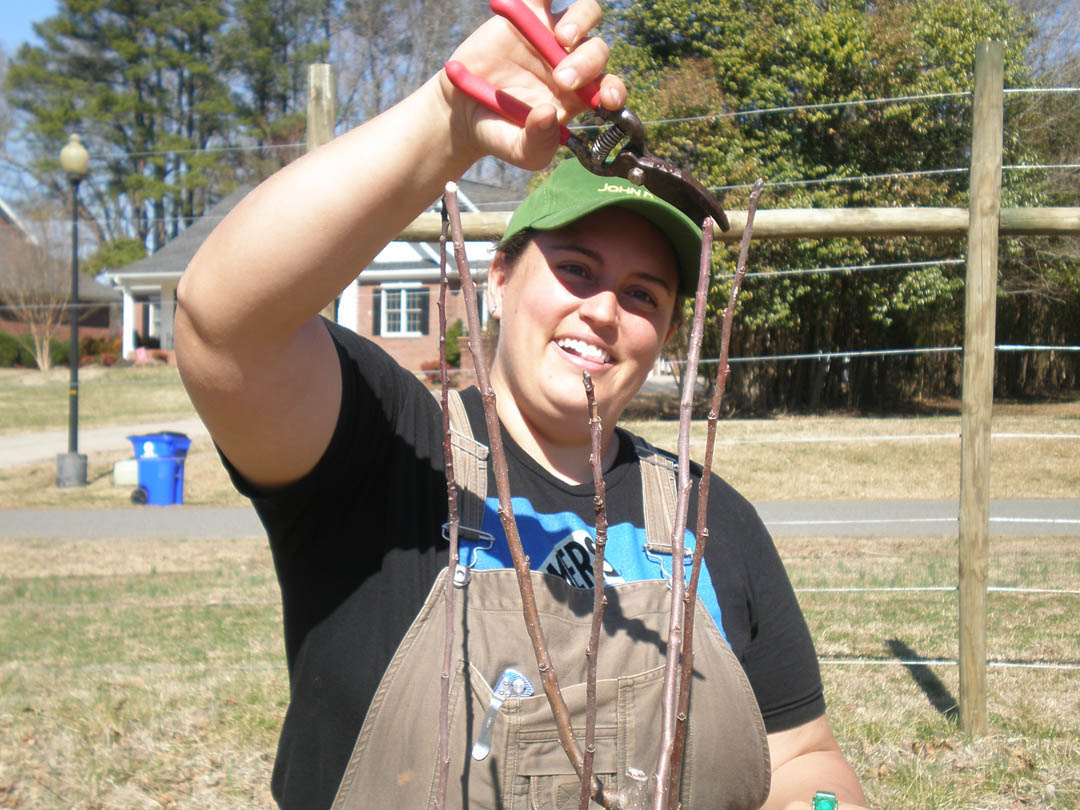
College News
CCCC orchard nourishes students and community
03.27.2014 • Admin, Faculty & Staff, College & Community, College General, Curriculum Programs
PITTSBORO - Hillary Heckler talks to her trees.
"You're looking good," she says to the Magness pear she prunes on the 1-and-3/4-acre orchard at the Central Carolina Community College campus in Pittsboro.
Heckler, who serves as Student Farm manager for the college's Sustainable Agriculture Program, said the new orchard is an effort to flesh out the program's curriculum to include perennial agriculture as part of the focus on sustainable and organic production practices at the farm.
"There aren't a whole lot of organic orchards out there," Heckler said. "We're taking more of a systems approach than a crop approach in the orchard's cultivation. We're interested in stability through diversity."
Heckler said that by creating a diverse environmental and agricultural system, the program is ensuring food security for the community over time by not relying solely on one or two crops but on 10 or 15 to provide its needs.
"Diversity creates resilience," she said. "Resilience within an ecosystem ensures a bounty of something each year in all kinds of areas, including environmental stability and food security."
The orchard includes six apple and six pear trees of differing varieties, five elderberries, nine blueberry bushes and three paw paw trees. Although it will be approximately three years before the trees produce fruit, there are numerous growing techniques for students to master before the first yield.
For example, young trees require the kind of formative pruning that Heckler is performing to eliminate potential problems before they occur. By selecting permanent scaffold branches - the part of the tree that will bear the weight of the fruit load - and pruning the narrower branches, Heckler is protecting the pear tree from future physical and structural weakness.
"We're building on what we do here," Heckler said of the orchard. "The campus isn't just serving our curriculum students; we can also operate the orchard through the Continuing Education Department to reach other groups within our community. We have food processing abilities through the Hospitality and Culinary Arts program, as well as the ability to offer organically grown fruit to the public. It is a great investment for our students and the greater community."
In addition, the orchard is an informational resource for local farmers who want to install their own orchards or are already in production. It provides access to new crops, regionally appropriate varieties within crops, and growing techniques that ensure successful yields for years to come.
Heckler expects the future to hold other learning opportunities such as how to add value to orchard crops through preservation methods including juicing, dehydrating, freezing and canning. Continuing to develop the local food system by distributing produce through local markets, food banks and churches is also a priority.
"I'm most excited about the cooperative efforts that exist and are created through CCCC's Sustainable Agriculture Program," said Heckler. "In America, we've established our understanding of the 'agri' part of agriculture, but it is the 'culture' in agriculture that excites me."
Agriculture doesn't exist in nature, she said. It is a human invention that can be whatever people want it to be.
"It's up to us to define and develop our culture in ways that are just, inclusive, fair to all and beautiful to both look at and be a part of," Heckler said. "Our students find us here at CCCC because we are actively participating in the redefinition of how we, as a culture, nourish ourselves and each other. There are so many ways in which agriculture touches peoples' lives and it's a privilege to help people reconnect with their environment and each other."
Fueled by community interest and demand, Central Carolina Community College's Sustainable Agriculture curriculum program was established in 2002 after six years as a Continuing Education program. It was developed in cooperation with North Carolina Agricultural Extension and with input from the Carolina Farm Stewardship Association.
The curriculum focuses on organic growing methods that preserve the environment and benefit the community. In addition to promoting environmental awareness and sustainable practices, the program strives to aid small farmers who have been hit by rising taxes, diminished markets for traditional crops and high costs. The program provides the small business and technical skills needed to develop and manage a profitable, environmentally sound and community-based small farm or agricultural business.
The curriculum covers a variety of subject areas, including organic vegetable production, sustainable cut flower production, sustainable livestock production, greenhouse design, farm maintenance skills, and business planning and marketing. Other CCCC curriculums that support and enhance sustainable living include Biofuels, Alternative Energy Technologies and Sustainable Building. CCCC offers an Associate of Applied Science in Sustainable Agriculture and certificates in agricultural sustainability, sustainable livestock and sustainable vegetable production.
For more information about the Sustainable Agriculture Program, contact Robin Kohanowich, SAP Coordinator at (919) 545-8031 or e-mail her at rkohanowich@cccc.edu.

Central Carolina Community College Student Farm Manager Hillary Heckler prunes a young pear tree in the college's new orchard, part of the Sustainable Agriculture Program at the Chatham County Campus. The orchard includes six apple and six pear trees of differing varieties, five elderberries, nine blueberry bushes and three paw paw trees. Although it will be approximately three years before the trees produce fruit, the orchard will provide numerous training opportunities for the students to learn correct growing techniques before the first yield. For more information about the Sustainable Agriculture Program, contact Robin Kohanowich, SAP Coordinator at (919) 545-8031 or e-mail her at rkohanowich@cccc.edu.
- Central Carolina Community College
- Serving Chatham, Harnett, & Lee Counties, NC
- 1-800-682-8353

